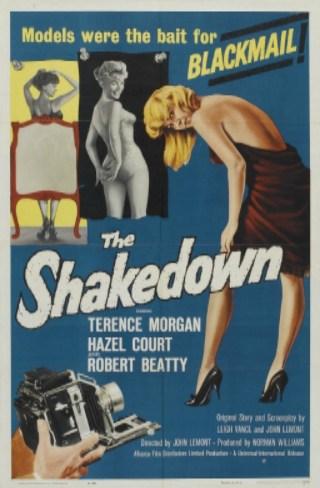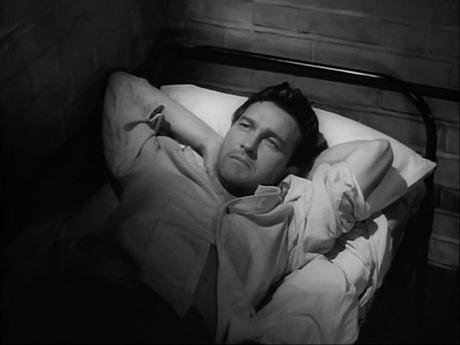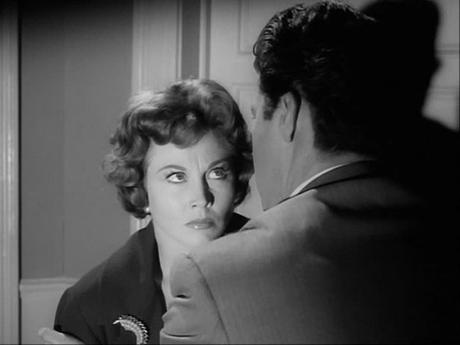
One criticism sometimes leveled at British crime or noir films is that they were too genteel, seemed too preoccupied with the concerns of middle class protagonists and, consequently, lacked that edge that frequently set apart and elevated their US counterparts. However, like a lot of generalizations and blanket statements it's not necessarily true; sure examples can be found where this is so but, by the same token, plenty of exceptions to this supposed rule also exist. The Shakedown (1960) is a surprisingly effective British noir that pulls few punches, isn't overburdened with wholesome characters and looks ahead to the franker approach to social issues that movies in the new decade would increasingly embrace.
Augie Cortona (Terence Morgan) is an angry young man, and one who happens to be spending his last night in prison having served a sentence for running a prostitution racket. Prowling back and forth , full of pent-up energy and resentment, he impresses upon his cellmate (Bill Owen) how he intends to regain his former position of prominence in the underworld. On release, that's exactly what he sets about doing, despite the warnings from Inspector Jarvis (Robert Beatty) that his every move will be tracked. And obstacles do lie before him, his old operations being taken over by rival hood Gollar (Harry H Corbett) and old friends in no great hurry to renew their relationship. Still, even when it looks like all doors will remain closed to him, he has a chance meeting in a pub with Jessel (Donald Pleasence), a down on his luck photographer. From this he senses an opportunity to strike out in a new direction. All he needs is the money to set himself up and the dubious rewards of a murky blackmail scheme await.

The Shakedown is essentially a classic gangster noir picture, a British variation on the type Hollywood had been turning out on and off since the 30s, a rise and fall saga of crime and criminals. It appears I spend a lot of time on here debating what might or might not constitute film noir, and what can be said to characterize it in any case. This is tricky enough when dealing with the classic American variety but gets tougher still when we move across the Atlantic. There are some instances of the traditional high contrast imagery in this movie but they don't dominate. Overall, I'd say The Shakedown has more of a flat look, but visuals aren't the only means of categorizing noir. The tone and mood have to be taken into consideration and are just as important. If director John Lemont merely flirts with shadowy imagery, he and fellow writer Leigh Vance indulge themselves more noticeably when it comes to the theme. The whole thing is seen from the perspective of Augie, a grasping thug with no redeeming features beyond an oily and superficial charm. This is where the real darkness of the picture lies, in the brazen and ruthless manipulation practised by the central character, in his self-serving attitude and in the (for the time) harsh language employed.
As was the case with a lot of British crime movies of the era, and there were a huge number of them, the budget was limited. I've noted previously how I don't necessarily regard such matters as failings and it's not a major issue here, although it is clear to see. Location work and exterior shots are kept to an absolute minimum and the action is largely restricted to the inside of a handful of buildings. But, as I sad, that doesn't make the end product less effective. One of the best sequences in the film is the sting Augie arranges to relieve his rival of his ill-gotten gains and thus get himself back in business. It plays out almost exclusively in an elevator and on a landing yet the way it's shot and edited together means it holds the attention throughout. And that basically sums up the movie - the tension is carefully maintained and the story is solid enough to keep us from paying undue heed to any other shortcomings.

Terence Morgan was a good choice in the lead. Just a few years before he had co-starred in Tread Softly Stranger, another enjoyable British noir, and he was just OK in that one. His role here suited him better as it allowed him to play up the suave nastiness without the need for any nervy introspection. Regardless of the fact we see most of the events from his point of view, no-one can realistically be expected to root for such a mean good for nothing type. Donald Pleasence garners some sympathy, as the photographer who gets duped and exploited but, for all his class and talent, he was never cast as anything other than a supporting character, and isn't on screen enough, sadly. The person we get behind is Hazel Court as the trainee model, her part develops nicely as the story progresses and a bit more depth is added. Ms Court should of course be familiar to cult movie fans for her work first on a few classic Hammer titles and then later in Roger Corman's AIP Gothic horrors. The support cast is packed with faces that will be familiar to anyone who's seen much British film or television - Bill Owen, Robert Beatty (whose talents have been lauded by a few commenters here in recent days), Eddie Byrne, Harry H Corbett (a guy I usually have trouble taking seriously in straight roles), Georgina Cookson, and an especially strong bit of work by John Salew as a blackmail victim.
The Shakedown has been released on DVD by UK outfit Renown and it's a moderate looking effort. By and large, the image is clean and acceptably sharp, but the aspect ratio can't be right - it's presented in Academy ratio and some kind of wide process must surely have been used by 1960. Still, it's not horribly compromised and I'd imagine it's as good as the film is going to get. The film is entertaining from start to finish and is one of those that retains a foot in both camps, holding onto a touch of the reserve of the previous decade while also nudging towards the more permissive style that the 60s would become associated with.
